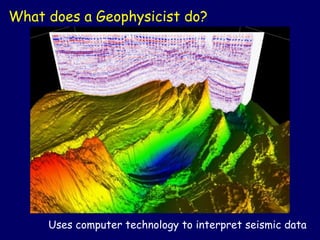All Categories
Featured
Table of Contents
Consumer Guide To Geological And Geophysical Services ... in Inglewood Western Australia 2023

Other possible geophysicist majors that aren't geophysics or geoscience consist of: Climatic sciences and meteorology Chemical and physical oceanography Earth science Environmental science Hydrology and water resources science Products science By earning any geophysicist degree, and by taking the required geology courses, you ought to get approved for an entry-level position as a geoscientist or geophysicist.
Eventually, trainees need to learn: a branch of geology that takes a look at the different elements of minerals, including chemical structure, internal crystal structure, and physical residential or commercial properties. the study of rocks and the procedures and conditions that form and change them with time. There are a few subdivisions in this branch of geology, including igneous, metamorphic, and sedimentary rocks.

This field takes a look at structural rock features such as cleavage, faults, joints, and small folds. They must also learn the computer skills required to: examine information create digital models and maps operate geoscientists' software Trainees must also benefit from all chances to gain real-world experience. Aspiring geophysicists should anticipate to hang around knowing: in the class in the field in labs Certainly, abilities taught in the classroom are really important for aiming geophysicists.
Standard And Guidance For Archaeological Geophysical ... in Mundijong Oz 2021
For example, geoscientists invest a great deal of their time outside when working in the field, so they need to possess "outdoor abilities" like outdoor camping and running boats, airplane, and other cars. Because they invest so much time in remote locations, it's necessary that geophysicists likewise have the physical stamina to bring needed equipment on their hikes to areas of research study.
The task provides: a high average and top earnings a high rate of individual complete satisfaction among geophysicists low work stress positive job outlook Additional details on incomes capacity and job outlook is detailed listed below. For trainees aiming to land an entry-level function as a geoscientist or geophysicist, it takes four years, or the time required to complete a bachelor's degree in geophysics or a related discipline.
Some research positions in geophysics need doctoral degrees. Also, if you prepare to teach at a college or university, you must make a Ph - Marine Geophysicist in Claremont Aus 2021. D. in geophysics or a related field. The time it takes to make a Ph. D. differs by institution and program, but it typically takes 4 to six years beyond the bachelor's degree.
Greeley-evans Area 3d Geophysical Survey in Sorrento Oz 2023
In reality, most employers require prospects to have a bachelor's degree in geophysics or a carefully associated discipline for all entry-level positions. And, sometimes, employers need a master's degree. As a result, there's no chance around the degree requirements for becoming a geophysicist. Most companies will anticipate or require a practicing geologist to be licensed for positions beyond those at the entry level.
Presently, 31 states need licensing for geologists, although licensing is not constantly required, specifically for entry-level work. The states that do concern licenses utilize the Fundamentals of Geology Examination (FGE), which is administered through the National Association of State Boards of Geology (ASBOG). Now that you understand which degree for geophysicist tasks you require, you'll need to land a task, and it's important to learn how much money you can make in this career.
According to BLS, the median annual wage for geoscientists is $93,580. According to BLS, certain industries offer higher salaries for geoscientists, and in some cases, they use higher-than-average revenues.
Geophysical Survey Definition in Ballajura Western Australia 2023
In reality, mining, quarrying, and oil and gas extraction offers over $32,000 more yearly than the typical yearly wage for this occupation. The federal government, too, provides over $10,000 more in profits than the nationwide average for geoscientists. In addition to industry type, geographical area can considerably affect incomes for this occupation.

The top-paying states and their yearly mean incomes, according to the BLS, consist of: Texas $166,720 Oklahoma $149,630 Pennsylvania $120,590 Hawaii $120,130 Colorado $107,260 These five top-paying states use much greater wages than the average for this profession. Wages for geoscientists in Texas are over $73,000 higher than the national average.
It needs to come as not a surprise that the majority of these high-paying locations remain in Texas and Oklahoma, however some are found in California, Louisiana, and Colorado. The leading 10 highest-paying metro locations for geoscientists are: Houston-The Woodlands-Sugar Land, Texas: $188,400 Tulsa, Oklahoma: $186,490 Midland, Texas: $167,040 Odessa, Texas: $147,080 Oklahoma City, Oklahoma: $145,350 Bakersfield, California: $130,080 Urban Honolulu, Hawaii: $124,470 New Orleans-Metairie, Louisiana: $121,030 Washington-Arlington-Alexandria, DC, VA, MD, WV: $120,180 Denver-Aurora-Lakewood, Colorado: $116,910 For some geoscientists and geophysicists, living in a metro city is not as appealing as living in a smaller sized neighborhood.
Table of Contents
Latest Posts
How To Become A Geologist Or Geophysicist in Ardross Aus 2023
Archaeological Geophysics And Geochemistry Planning A Geophysical Survey: Environmental & Physical ... in Applecross Aus 2022
Why Study Geophysics? in Mundijong WA 2022
More
Latest Posts
How To Become A Geologist Or Geophysicist in Ardross Aus 2023
Archaeological Geophysics And Geochemistry Planning A Geophysical Survey: Environmental & Physical ... in Applecross Aus 2022
Why Study Geophysics? in Mundijong WA 2022